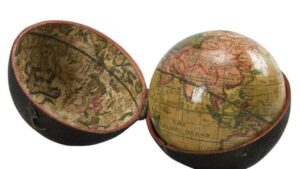Americanism Redux
October 26, your today, on the journey to the American Founding, 250 years ago, in 1773
The marriage you expected, and the marriage you have. One is the life of love. The other is the life of reality. If you’re lucky or blessed or both, the two intersect. They share some ground. The record of the sharedness is the story of the marriage.
(her ring)
* * * * * * *
Rachel is 27 years old. Newly married, a golden ring has been on her finger for not quite three weeks. She’s still getting used to the feel and the fit.
She sees the home around her: how will I manage?
Never married until now, Rachel is the second wife of her husband. She’d known him for just a few months—about the same amount of time his first wife had been dead—and is now step-mother to his six surviving children. Her new mother-in-law has been kind enough (taken pity on her?) to agree to help her raise and care for these half-dozen kids. One of the children is just a dozen years younger than Rachel, making the challenge all the greater. With the steps plus the in-law, Rachel’s new family is double-blended. The ring, the bond, on her finger has not yet made its imprint.
Her new husband has left the family home only a few minutes ago. He’s off to another meeting. Another occasion that he’ll have to speak of in hushed tones and clipped wording. Likely, he’ll have still more meetings the day after today and the day after that. When will the meetings end? Rachel doesn’t know. When will the husband and father be able to be a real part of this double-blended family? Rachel hopes it will be soon.
Remember, though, she’s new to marriage. Rachel can’t see where it all stops.
Inside the wedding ring on Rachel’s finger, her silversmith husband, a pro-colonial rights planner working on how to deal with the East India Company Tea enroute to Boston, has artfully engraved “Live Contented.”
He is Paul Revere.
Across the room, Rachel sees her mother-in-law talking with the eldest daughter. Paul is nowhere in sight.
(Rachel, re-enacted)
* * * * * * *
Paul Revere reads one of Boston newspapers, the Gazette, and sees today, 250 years ago, an essay with the false-name of Scaevola. The name harkens up the ancient Roman past with a hero who volunteered to kill an invading king. The current-day author Scaevola reaches back into the more recent past, eight years ago in 1765, to invoke the Stamp Act crisis and link the EIC’s tea to the upheaval in the mid-1760s. It’s one and the same, he says, sequential links in the constant chain. Enslaving.
The author also writes in aggressive words that the men who have agreed to be agents for the EIC’s tea should resign, like the stamp agents did eight years ago. He states that this would be a demonstration of solidarity with pro-colonial rights supporters, people like the Reveres. “It is in your power and you are now warned of it, to save YOURSELVES much Trouble, and secure your native country from the deadly Stroke now aimed in your persons against her.”
(Gaius Mucius Scaevola)
* * * * * * *
In New York City, Alexander McDougall sits and looks at an essay he’s writing. He’s at the other end of the newly opened post road and fast-running carriage route between New York City and the Revere’s home town of Boston. McDougall is nearly done with his fifth essay in his “The Alarm” series published in a New York newspaper. He writes as “Hampden”. It’s another historical reference, this time to a 17th century English leader of an anti-royalty movement in the reign of King Charles I.
“The Alarm” will travel to the Reveres in a coach up the post road or in a ship up the Atlantic Coast.
Since his fourth published essay a couple of weeks ago, McDougall has decided to advance his arguments in opposing the EIC tea. Beyond putting forth talking points that his readers can use to rebuke pro-tea proponents, as he did in the prior essay, McDougall chooses now to explain another chapter of recent history, the 1768 taxes on tea, lead, paper, paint, and glass. McDougall in “The Alarm, No. 5” will be reminding his readers of the colonial economic boycott organized to defeat the five taxed items. He urges the tea agents and other colonists to re-apply the boycott again in 1773. It’s a ready-made approach. Articles like “The Alarm” will be shared by the Committees of Correspondence and will quickly make their way into the hands of Paul Revere and other Boston-based opponents of EIC tea.
Paul and Rachel Revere will clearly recall the fresh memories invoked by McDougall. They know well the riots caused in Boston by the Stamp Act as well as the economic boycott that occurred both then and again a few years later in the late 1760s. It’s only three or four years ago.
McDougall chose well his theme for the fifth “Alarm”.
* * * * * * *
A short distance south of Rachel and Paul Revere, across the Massachusetts-Connecticut border, in Stonington, Reverend Joseph Fish counts the clapboard nails, shingle nails, glass panes, and plank boards. These are the materials the builders will use in constructing a new school in Stonington for local Pequot Natives. It’s been over a year since he got funding for the project from donors back in England.
Reverend Fish worries over a particular issue that has flared up among Pequot men and women in Stonington. It’s inter-racial and inter-ethnic marriages. Native and non-native, Native and black, Native of one tribe to Native of another tribe, whatever the formula the frequency of these marriages are happening throughout the town. Some Pequot leaders despise the practice. Fish hopes the new school will give him a forum for discussing the topic, calmly and peacefully.
Every day and every night he takes down notes from his observations about this and other aspects of Pequot life.
And so, too, every day in Boston members of the double-blended Revere family walk by Province House, official home of the hated Massachusetts Royal Governor, Thomas Hutchison. Above them, atop the cupola of the house, a weather vane waits for the wind to blow. It’s shaped in the figure of a Pequot Native warrior, holding a bow with an arrow poised on the string.
Today, 250 years ago, Natives remain an important aspect of, and presence in, British colonial life.
(the Province House weathervane)
Also
Look where you will on this day, 250 years ago. It’s a common condition—the existence of imperial entities and various levels of anti-imperial resistance, protest, and turmoil.
In northern Mexico, both in the Rio Grande valley and in Baja California on up the Pacific Coast, you’ll see tensions and, in one case, an uprising against Spanish colonizers. Tarahumara Natives and several other Native groups resent the Spanish.
In the central Plains of North America the Sioux Natives are expanding their domain through hostile and violent means. Their aggression results in a constant state of disruption along the edges of land under their control, patrolled so effectively on the horses they’ve mastered.
In central Europe, the Polish people are watching their struggle for independence die day-by-day, victim of land-hungry empires surrounding them, including Austrian Habsburgs, Prussia, and Russia. Still clutching their dreams of self-rule, Polish patriots look to their language and educational system to keep a national spirit alive.
In China, the Qing Dynasty has begun a series of brutal attacks on the Junchuan hill tribes. This follows a unsuccessful series of attacks on the neighboring Konbaung Dynasty (modern Myanmar). On the other side of the world, in Philadelphia not far from the colony’s State House, the American China Manufactory in Philadelphia, producers of porcelain using Chinese technology, is closing down. It’s a failed start-up business.
In Africa, leaders of the Ashanti empire, the very word rooted in the term for “because of war,” use armed force and belligerent diplomacy to exert control over Akan groups. This combination of military and negotiated power is the basis for a vast network of small city-states brought forcibly together under Ashanti rule. A key event in Ashanti history had been the battle of Feyiase earlier in the century.
All of these human struggles spin under the heavenly stars and so it is, rightfully, today, 250 years ago, that Charles Messier discovers a new turning strand in the night sky, 23-million light years away. The name selected by Messier is apt.
The Whirlpool Galaxy.
(Ebenezer Storer’s pocket globe, Boston, 1770s)
For You Now
Maybe we should call it part of the human condition, this ongoing strife in how, why, and where we arrange ourselves in community. Like Messier’s discovery, we have a strain in us that can tend toward the chaotic, the disordered, the violent, the vicious. Sometimes it is kept in check, whether by happy or unhappy means. Oftentimes struggles and clashes are involved that can, in the particular moment, become the defining theme of community itself. It powers the motion, a Whirlpool.
The question is less of whether the strain exists. It does. As we can tell in our Redux entries, there’s no question of its role in 1773. No, I suggest the more compelling question begging for an answer is this: what happens after the struggle ceases?–what is left? Does anything make the thing turn the other way?
The whirlpool of the British colonies is the impending arrival of EIC tea. Though traveling aboard eight ships in a wavy, watery line, it’s acting for all intents and purposes with the same rotating motion of the whirlpool, pulling everything into the center. We’ve seen lots of life—families, marriages, hopes, dreams, desperation, hatred, and more—and every piece circles with only partial awareness of directions being taken.
Some of the British colonists know they don’t want the tea. They make arguments that it’s just the beginning; allow this, say they, and a thousand more calamities will ensue. Much further than that, they’re unable to go, at least not yet. Their focus is on what they oppose. Other British colonists aren’t at all sold on the position and even go so far as to endorse the ideas inherent in the tea. They have a singular advantage in that they know what can come next—meaning, nothing, nothing different from what’s been coming up to now, the status quo. They oppose the opposers, a position heavy in clarity without an ounce of inspiration. It’s a weight that’s all burden.
Here’s where things find a grip. Who among the other cited places of empire—from China to California—have world-changing notions circling their heads? Is it substantially more than “I just want us, my tribe and my people, to be left alone”?
Such a question isn’t posed in order to disparage. It’s meant to suggest that you go back to the Philadelphia Resolutions of last week’s Redux entry and consider their implications for a future no one has yet lived.
Maybe we should emulate Charles Messier and aim his telescope on the Pennsylvania State House and the ideas emanating from the hall inside. They’re a week old from a past light-years away.
They can swirl and cast a brilliant light, too.
(The Whirlpool Galaxy)
Suggestion
Take a moment to consider: what’s the most important thing to you about self-government?
(Whirlpool Park, Niagara River)















